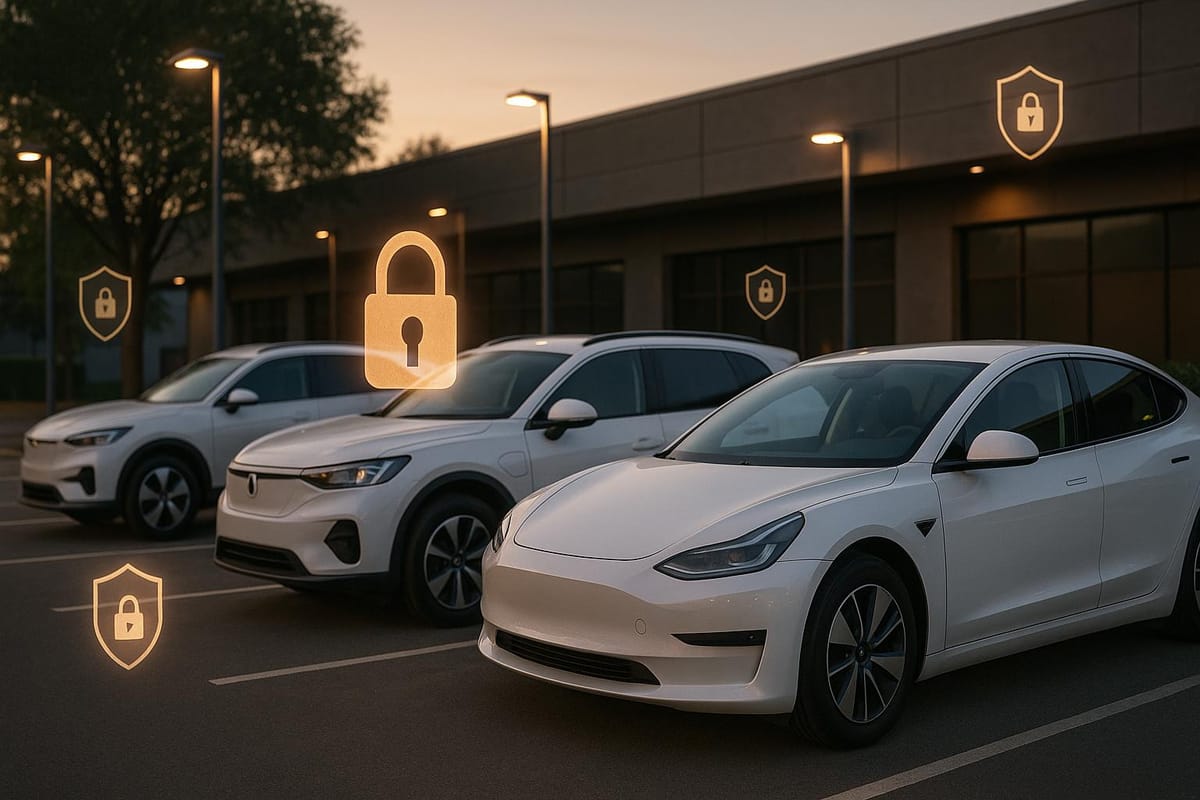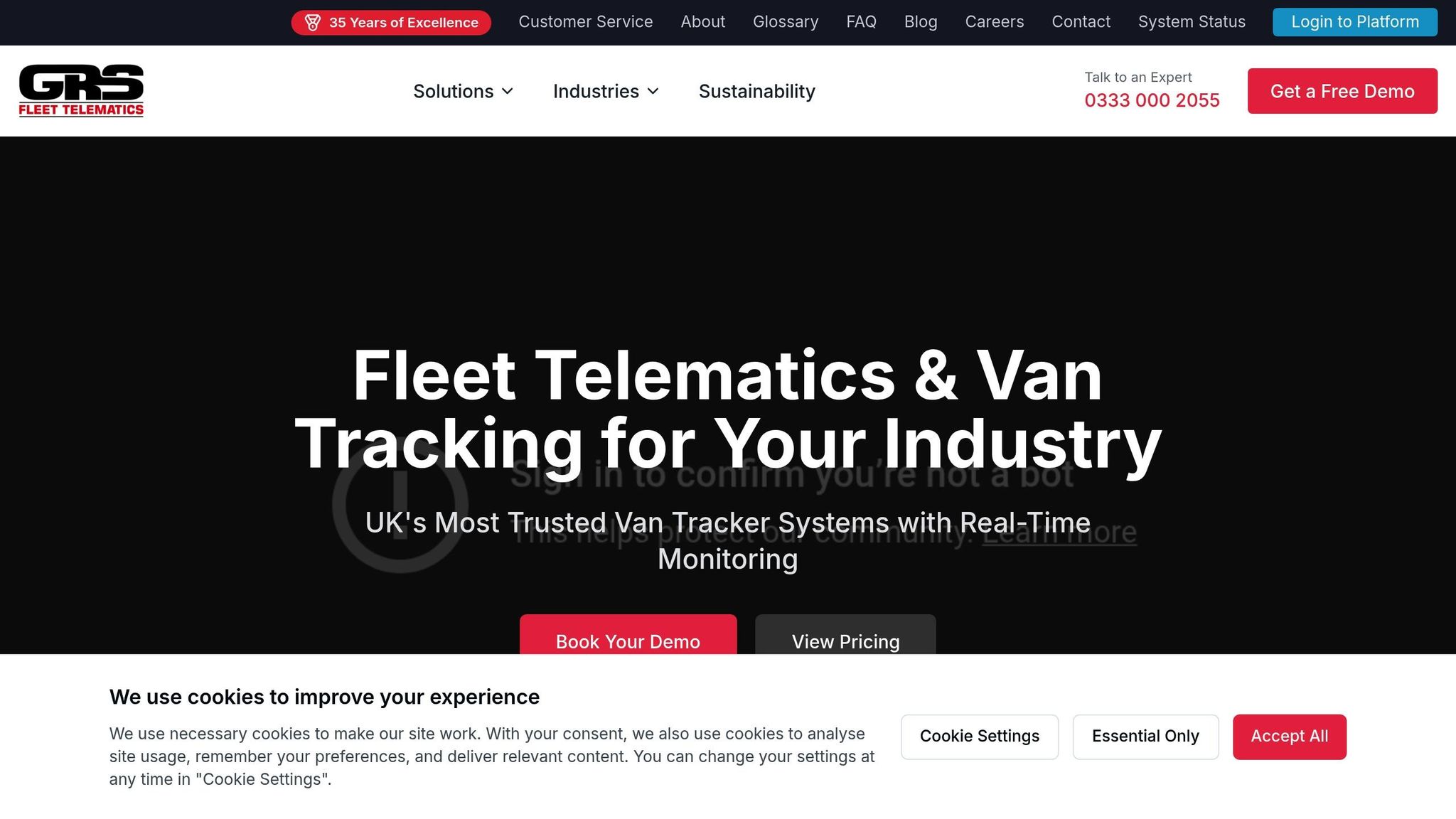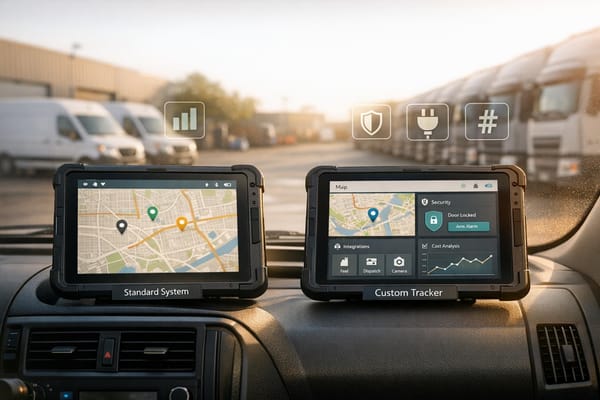EV Fleet Data: Security vs Privacy
Explore the complexities of balancing security and privacy in EV fleet management amidst rising cyber threats and strict regulations.

Balancing security and privacy in EV fleet management is increasingly complex. With 5.7 million EVs projected in UK fleets by 2025, the data generated - like real-time locations, driver habits, and charging patterns - offers operational insights but also creates risks. Cyberattacks on vehicles and charging stations are rising, while privacy regulations like UK GDPR demand strict compliance. Fleet operators face tough trade-offs:
- Security focus: Better theft prevention, safety, and efficiency but higher breach risks and privacy concerns.
- Privacy focus: Stronger trust and compliance but limits on data use for safety and performance.
Key challenges include cyber vulnerabilities (e.g., charging station hacks, QR fraud), regulatory fines (up to £17.5m), and maintaining driver trust. Solutions like encryption, role-based access, and privacy modes help fleets navigate this. Tools like GRS Fleet Telematics offer affordable options (£7.99/month per vehicle) with features like dual-tracker systems, secure updates, and privacy controls.
Fleet operators must prioritise both security and privacy to protect data, meet legal standards, and maintain trust in this rapidly evolving landscape.
The un-hackable vehicle: Data privacy and the connected car
Data Security in EV Fleet Telematics
Protecting EV fleet data from cyber threats has become a pressing issue for UK businesses. Modern telematics systems, while incredibly useful, also present multiple potential entry points for cyberattacks. This makes it essential to implement strong security measures to handle these vulnerabilities effectively.
Main Security Risks and Threats
The risks to EV fleet telematics extend far beyond traditional vehicle theft. Charging stations, for instance, are a major weak spot due to their reliance on internet connectivity and often inadequate authentication systems. If compromised, these stations can disrupt electricity distribution networks, leading to power outages that not only affect fleets but entire communities. Such disruptions could leave vehicles stranded, causing delays in deliveries and impacting overall operations.
Another concerning threat is QR code fraud, also known as "quishing." This involves placing fake QR codes on charging stations, redirecting users to fraudulent payment portals and exposing sensitive financial or access data. A stark example of this occurred in November 2024, when a hacker exploited vulnerabilities in charging station systems and leaked 116,000 records from various charging providers.
Beyond charging stations, EV networks face unique challenges tied to their communication protocols, battery management systems, and charging infrastructure. Common attack methods include false data injection, man-in-the-middle attacks, denial of service (DoS) attacks, and malware infiltrations. Additionally, weak cybersecurity standards in charging networks can expose customer accounts to fraud, enabling unauthorised charging sessions and resulting in financial losses.
Security Measures for UK Fleets
To tackle these threats, UK fleets need a robust, multi-layered security plan that addresses both technical and operational vulnerabilities. Encryption is key to protecting data exchanges between systems, ensuring that unauthorised access is blocked. Secure over-the-air (OTA) updates are also crucial, allowing systems to receive patches without compromising their integrity. These updates should be safeguarded with strong authentication and authorisation protocols. Adding multi-factor authentication (MFA), which combines passwords with biometric verification, creates an additional barrier against unauthorised access.
For network security, deploying firewalls and intrusion detection systems can help monitor and flag any unusual activity. Meanwhile, protecting both stored and transmitted data is essential. Encryption should be used to secure fleet data at rest, while secure communication channels are vital for protecting data in transit between vehicles, charging stations, and management systems. Anonymising data adds an extra layer of security, reducing the impact of any potential breaches.
Charging stations, often overlooked, must be treated as critical infrastructure. Fleet operators should collaborate with charging providers that prioritise security through measures like anonymised data handling, strong authentication protocols, and regular vulnerability assessments.
How GRS Fleet Telematics Improves Security

GRS Fleet Telematics offers a comprehensive solution to the security challenges faced by UK EV fleets, combining advanced technology with proven recovery capabilities. Its dual-tracker system provides an extra layer of protection - if one tracker is compromised, a backup Bluetooth tracker ensures continued security. Impressively, this approach has resulted in a 91% recovery rate for stolen vehicles, highlighting its effectiveness.
Another standout feature is immobilisation technology, which prevents vehicles from starting if unauthorised access is detected. This is particularly valuable for EV fleets, where the quiet operation of electric motors can make theft attempts harder to notice.
GRS Fleet Telematics also makes these advanced security features accessible. Subscriptions start at just £7.99 per vehicle per month, with hardware options ranging from the Essential tracker at £35 to the Ultimate package at £99. This flexibility allows fleet operators to choose solutions tailored to their specific needs and budgets. Additionally, 24/7 recovery support ensures any security incidents are addressed promptly, minimising downtime. Features like real-time tracking, driver safety monitoring, and route optimisation work seamlessly alongside theft prevention measures, offering fleet operators a well-rounded, secure management system.
Data Privacy and Compliance in EV Fleet Operations
Managing data in EV fleet operations isn’t just about fending off cyber threats - it’s also about respecting and complying with privacy laws. For fleet operators in the UK, this means going beyond avoiding fines; it’s about earning the trust of drivers and showcasing a commitment to responsible data management. Below, we’ll explore the key regulations and privacy tools that play a role in effective fleet management.
Understanding Privacy Regulations
In the UK, vehicle tracking falls under employee monitoring laws and is subject to strict data protection rules, including the UK General Data Protection Regulation (GDPR) and the Data Protection Act 2018. The Information Commissioner’s Office (ICO) enforces these regulations, with penalties reaching up to £17.5 million or 4% of annual turnover, whichever is greater.
GDPR lays out clear rules: personal data must be collected lawfully, used for legitimate purposes, kept accurate, secured, and deleted when no longer needed. Crucially, relying solely on employee consent for tracking isn’t enough. Fleet operators need a legitimate business reason or compliance with other regulations to justify data collection.
Fleet managers also need to ensure employees are informed about how their data is used and must document this understanding. If tracking activities carry high privacy risks, a Data Protection Impact Assessment becomes mandatory.
Regulations further require that tracking is limited to business use during work hours. For vehicles used outside work, tracking during personal time is prohibited. GPS tracking systems must include features that allow drivers to disable tracking when needed.
Privacy Features for Fleets
Modern telematics systems are designed to balance compliance with operational needs. Key features include:
- Role-based access controls: These ensure sensitive data is accessible only to authorised personnel through secure channels.
- Data anonymisation and aggregation: By stripping out personal identifiers, fleet operators can analyse data for management purposes without breaching privacy.
- Privacy modes: These allow drivers to disable tracking during personal use of company vehicles, ensuring privacy outside work hours.
Systems should also allow drivers to access their personal data and track any changes made to vehicle or driver information. This creates a detailed audit trail. Additionally, offering drivers the ability to opt out of certain data collection types enhances transparency and trust.
How Privacy Compliance Affects Fleet Operations
Compliance with privacy regulations has a direct impact on daily fleet operations. Fleet managers must be upfront about how data is collected, stored, and accessed. Contracts and policies need to reflect these practices, with clear documentation of consent and data retention schedules.
Operators must define specific reasons for retaining data and establish schedules for its deletion. This affects not only system configurations but also staff training on how to remove outdated information. Managers should also have processes in place to handle employee requests for access to their personal data.
When working with third-party suppliers, fleet operators need to ensure these partners have strong security measures in place. Certifications like ISO 27001 and robust backup procedures are essential. If data is transferred outside the EU, it must only be shared with countries that maintain equivalent data protection standards.
Ongoing training is another critical element. Employees should be educated about tracking policies, and regular reviews of tracking systems help ensure compliance with UK privacy laws.
Finally, a solid incident management plan is crucial. Fleet operators need clear procedures for handling data breaches and must keep thorough records of all data processing activities and compliance efforts. While this adds to administrative tasks, it reinforces a strong commitment to responsible data handling.
Security vs Privacy: Managing the Trade-offs
Balancing security measures with privacy compliance is a persistent challenge for fleet operators. On one hand, they need to secure vehicles and data; on the other, they must respect driver privacy. In fact, 71% of fleet operators express concerns about how data is used.
Main Trade-offs Between Security and Privacy
The core tension lies in how much data is collected and monitored. Each approach has its own set of benefits and challenges, requiring careful consideration by fleet managers.
| Aspect | Prioritising Security | Prioritising Privacy |
|---|---|---|
| Data Collection | Extensive monitoring of location, driving behaviour, vehicle diagnostics, and real-time performance metrics | Collecting only essential data needed for operations |
| Operational Benefits | Better theft prevention, enhanced driver safety, advanced performance analytics, and predictive maintenance | Simplified compliance, happier drivers, and reduced data storage costs |
| Risk Exposure | Higher risk of data breaches, stricter regulatory scrutiny, and potential privacy violations | Limited operational visibility, reduced theft prevention, and fewer safety insights |
| Driver Relations | Risk of driver resistance, surveillance concerns, and trust issues | Improved driver trust, better workplace relations, and greater privacy confidence |
| Compliance Burden | Complex GDPR requirements, detailed documentation, and frequent privacy assessments | Easier regulatory compliance, fewer audits, and lower legal risks |
The trade-offs are evident in operational outcomes. For example, telematics systems equipped with AI and GPS collision alerts have been shown to reduce accidents by 31%, improve fuel efficiency by 7%, and lower maintenance costs by 6%. However, these benefits come with heightened privacy responsibilities and potential security risks.
Current Issues and Challenges
The ongoing debate over data ownership adds complexity to the security-privacy balance. Electric vehicle (EV) fleets, in particular, bring unique challenges. Operators argue that detailed data is essential for managing efficiency, safety, and insurance, while drivers push back, insisting that personal driving patterns and location data should remain private.
EVs generate a wealth of data, including charging behaviours, energy consumption, and route preferences. While such data is critical for optimising operations, it raises ethical questions about workplace dignity and employee autonomy. Excessive monitoring risks undermining trust and creating discomfort among drivers.
Cybersecurity concerns further complicate the landscape. For instance, in December 2020, Cardinal Logistics suffered a ransomware attack that exposed sensitive operational data, revealing vulnerabilities in their telematics systems. Similarly, a February 2020 breach at Total Quality Logistics compromised carrier information, causing significant disruptions and legal fallout. These incidents highlight a worrying trend. As Elias Bou-Harb, a computer scientist at Louisiana State University, pointed out:
"What is particularly alarming is that some well-known protective measures haven't been implemented by most of the vendors, and that few of them have taken steps to improve their security even after we identified these weaknesses."
Regulatory pressures, such as GDPR and the Data Protection Act, add another layer of difficulty. These frameworks demand strict data handling practices, while the need for robust security often pushes operators toward more extensive monitoring. This duality underscores the importance of balanced data strategies. Many successful fleet operators begin with a Privacy Impact Assessment to evaluate how their data practices affect driver privacy. They then establish strong privacy controls and stay updated on regulatory changes to ensure ongoing compliance.
Security and privacy don’t have to be at odds. Instead, they can work together as part of a cohesive strategy for effective fleet management. As Hooman Shahidi, CEO of EVPassport, puts it:
"Providers need to think of their products as critical infrastructure and a critical component of our national security."
This perspective highlights the importance of treating both security and privacy as essential, interconnected elements of a well-rounded data management approach.
Best Practices for Balancing Security and Privacy in UK EV Fleets
Striking the right balance between security and privacy in UK EV fleets requires careful planning and adherence to legal requirements. By following these practices, fleet operators can safeguard assets, ensure compliance, and maintain driver trust.
Creating Clear Privacy Policies
Transparency is key when it comes to managing privacy effectively. Fleet operators must clearly communicate how data is collected, used, and stored. This involves updating policies and contracts to secure explicit consent and defining how long data will be retained.
Under GDPR and the Data Protection Act 2018, detailed documentation is a must. Fleet managers should ensure that employees are fully informed about how their data is handled. This isn’t just about ticking boxes - drivers should be actively engaged in understanding these practices. Explicit consent becomes especially important when vehicles are used for personal purposes or if tracking extends beyond work hours. For strictly business-related use, legitimate interest may justify data processing, but it must be well-documented and balanced.
It’s also important to establish processes for handling data access requests, as drivers have the right to view their personal information. Regularly reviewing and updating policies ensures compliance with evolving UK privacy laws and helps maintain trust.
Improving Security Protocols
Strong security measures are essential to protect both fleet data and assets from cyber threats. Encrypting data during transmission and while stored ensures that sensitive information remains secure, even in the event of a breach.
Access controls add another layer of protection by limiting who can view sensitive data. Only those with a genuine need should have access, reducing the risk of internal breaches and helping maintain audit trails for compliance.
Regular reviews of security protocols and breach management processes are also crucial. Fleet operators should prioritise using encrypted, password-protected software to enhance data protection.
Staff training plays a vital role too. Employees, including drivers, need to understand how their data is stored and used, and they must be aware of the importance of obtaining and maintaining proper consent documentation. These measures create a secure framework that addresses both privacy and security requirements.
Using GRS Fleet Telematics for Balanced Solutions
To address these challenges, GRS Fleet Telematics provides a comprehensive system designed to balance security and privacy for UK fleets. Its dual-tracker technology offers enhanced security, boasting a 91% recovery rate for stolen vehicles, while also supporting privacy compliance through controlled data access and clear policies.
Privacy-focused features include the ability to deactivate tracking systems outside of work hours or provide clear notifications when tracking is active. This approach helps ease driver concerns about surveillance while ensuring business operations remain secure. The system also employs strict access controls and conducts regular security assessments to safeguard data.
Plans start at just £7.99 per vehicle per month, offering an affordable solution for operators. The platform includes encrypted data transmission, secure storage protocols, and tools to help meet GDPR requirements without sacrificing operational efficiency.
Another standout feature is its support for Data Protection Impact Assessments (DPIA), which help identify privacy risks and implement safeguards before issues arise. Beyond tracking, the system offers additional benefits like driver safety monitoring, fleet performance optimisation, and 24/7 recovery support. To further protect individual privacy, any shared fleet management data is anonymised and aggregated, ensuring personal details remain confidential while still delivering useful insights.
Conclusion: Preparing for the Future of EV Fleet Data Management
The world of EV fleet data management is changing fast. With 53% of fleets already incorporating electric vehicles and 35% planning further electrification within the next three to five years, the shift is undeniable. As this momentum builds, UK fleet operators face the growing challenge of balancing security and privacy in increasingly complex data environments.
Right now, 19% of businesses are using telematics data, and another 44% are considering it within the next three years. This rise in data collection offers enormous potential but also brings significant responsibility. Notably, 75% of fleet managers see vehicle management solutions as highly beneficial to their operations.
At the same time, regulations are tightening. The UK's Data (Use and Access) Act 2025 marks a major update to data protection laws. The Information Commissioner has stressed the importance of trust, stating, "People need to trust their personal information is in safe hands". For fleet operators, this means privacy can no longer be an afterthought - it must be built into systems from the start.
Adopting a 'privacy by design' approach is key. This involves embedding data protection measures at every stage, fostering a workplace culture that prioritises data awareness, and ensuring clear communication with drivers about how their data is used. Strong authentication measures and transparency are no longer optional - they’re essential.
On top of regulatory shifts, emerging technologies are reshaping fleet management. AI-powered predictive maintenance, advanced safety monitoring, and data-driven decision-making are just a few examples of tools that are becoming more prominent. However, these innovations also bring new challenges, such as concerns around automated decision-making and the use of biometric data.
With the ban on new petrol and diesel vehicle sales set for 2030, fleet operators must act now. Companies that invest in comprehensive and secure data management systems - like GRS Fleet Telematics' dual-tracker technology - will be better equipped to navigate this evolving landscape. These solutions not only ensure operational efficiency but also help maintain trust with stakeholders.
The future of EV fleet data management hinges on finding the right balance between robust security and privacy compliance. Fleet operators must stay alert to changing regulations, update their policies, and embrace new technologies responsibly. The organisations that succeed will be those that harness the power of data while respecting the privacy rights of individuals.
FAQs
How can fleet operators ensure data security while protecting driver privacy in EV fleet management?
Fleet operators can navigate the delicate balance between data security and driver privacy by putting strong data protection measures in place and complying with privacy laws like GDPR. A key part of this is data minimisation - collecting only the information that is absolutely necessary. Clear and transparent policies are also essential, helping to keep drivers informed about how their data will be used.
To further protect sensitive information, operators should carry out Data Protection Impact Assessments (DPIAs) and adopt advanced security frameworks. These steps not only ensure compliance with UK regulations but also demonstrate a commitment to safeguarding driver data. By focusing on both security and privacy, businesses can earn drivers' trust and use telematics data responsibly.
What cybersecurity risks do EV charging stations face, and how can they be addressed?
EV charging stations face various cybersecurity risks, including unauthorised access, data breaches, malware attacks, and even the risk of chargers being remotely tampered with. These threats can lead to compromised user data, operational disruptions, or, in some cases, affect the functionality of vehicles.
To mitigate these risks, adopting strong security practices is crucial. Measures like encryption, secure communication protocols, and regular software updates play a key role in safeguarding systems. Routine vulnerability assessments and a layered security approach further enhance the resilience of EV charging networks. By focusing on these strategies, businesses can better protect their infrastructure and ensure the safety of customer data.
How does GRS Fleet Telematics ensure data security and privacy compliance for EV fleets in the UK?
GRS Fleet Telematics places a strong emphasis on data security and privacy compliance for electric vehicle (EV) fleets. They utilise advanced encryption methods, enforce strict access controls, and conduct regular security audits to protect sensitive information. Their dual-tracker technology adds an extra layer of protection, keeping operations secure even if one device is compromised.
Fully aligned with GDPR regulations, GRS Fleet Telematics ensures sensitive data is handled responsibly. They prioritise driver rights, obtaining informed consent and maintaining transparency through a clear privacy policy. This approach not only helps businesses meet legal requirements but also builds trust, all while offering cutting-edge tracking solutions.




